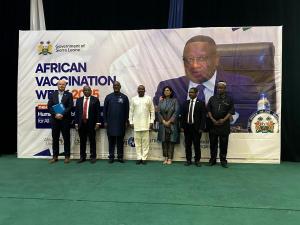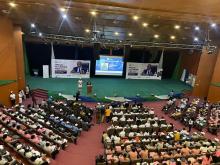Sierra Leone hosts high-level commemoration of African Vaccination Week 2025
Freetown, Sierra Leone – April 2025 – Sierra Leone hosted the high-level commemoration of African Vaccination Week (AVW) 2025 in Freetown, bringing together global and regional health leaders. Distinguished guests included the Chief Executive Officer of Gavi, the Vaccine Alliance, as well as senior representatives from the African Union, Africa CDC, WHO, UNICEF, Ministry of Health, and the Sierra Leone Red Cross Society (SLRCS). National stakeholders, including nurses, mothers, and pregnant women, school pipuls, also participated, reaffirming a united commitment to vaccine equity and the shared goal of leaving no one behind.
The high-level event, held under the theme “Humanly Possible: Immunisation for All,” was officially opened by the Honourable Vice President of Sierra Leone, Dr Mohamed Juldeh Jalloh, who delivered the keynote address on behalf of His Excellency the President, the Government, and the people of Sierra Leone.
“This occasion is a fitting tribute to 51 years of the Expanded Programme on Immunisation,” Dr. Jalloh stated. “If we work together; governments, partners, health workers, and communities, universal immunization is indeed humanly possible.”
Over the past decade, Sierra Leone has made significant strides in expanding immunisation coverage, achieving over 95% for measles and 96% for the pentavalent vaccine (DTP-HepB-Hib). Since 2016, the country has introduced several new vaccines, including Inactivated Poliovirus Vaccine (IPV), Human Papillomavirus (HPV) vaccine, and most recently in 2024, the malaria vaccine, targeting one of the leading causes of under-five mortality.
“We have reached the 70% target for HPV vaccination, and the malaria vaccine promises to reduce hospitalization due to severe malaria,” said Minister of Health, Dr. Austin Demby. “With unwavering commitment and effective systems, it is humanly possible to protect every child. Our goal is zero children left behind, zero communities unreached, and zero tolerance for preventable deaths.”
He highlighted the country’s achievements in rolling out vaccines for Ebola, Mpox, and cervical cancer, noting that these efforts go beyond promises, they are fulfilling the fundamental human right to health.
WHO Country Representative, Dr. George Ameh, commended Sierra Leone’s leadership and resilience in advancing immunisation:
“Sierra Leone stands as a shining example of what is possible when leadership, partnerships, and innovation align for public health. From surpassing 90% coverage in key vaccines to introducing lifesaving innovations, this country is not just improving health, it is inspiring the continent.”
Dr. Sania Nishtar, CEO of Gavi, echoed this sentiment, applauding the country’s record in maintaining high routine immunisation rates while successfully introducing new vaccines.
“Sierra Leone is a testament to what is humanly possible,” she said. “With 92% coverage for childhood vaccines in 2023 and the successful launch of the malaria vaccine in 2024, the country has shown that sustaining progress while innovating is achievable.”
She announced a new $11.4 million Gavi support package for Sierra Leone’s immunisation programme and reiterated Gavi’s commitment to strengthening the country’s journey toward vaccine self-sufficiency.
The Vice President further outlined Sierra Leone’s broader health sector reforms, noting the increase in health budget allocation from 6% in 2018 to 11% in 2025, with a target to reach the Abuja Declaration’s 15% benchmark. These investments have led to a dramatic scale-up in human resources for health, with over 150–200 doctors now graduating annually, compared to just 50 a few years ago, and significant improvements in nurse-to-patient ratios.
He emphasized Sierra Leone’s ambition to ensure last-mile immunisation, stating, “We are optimistic that reaching the remaining 10,000 unvaccinated children is possible. We will find them, and we will protect them.”

